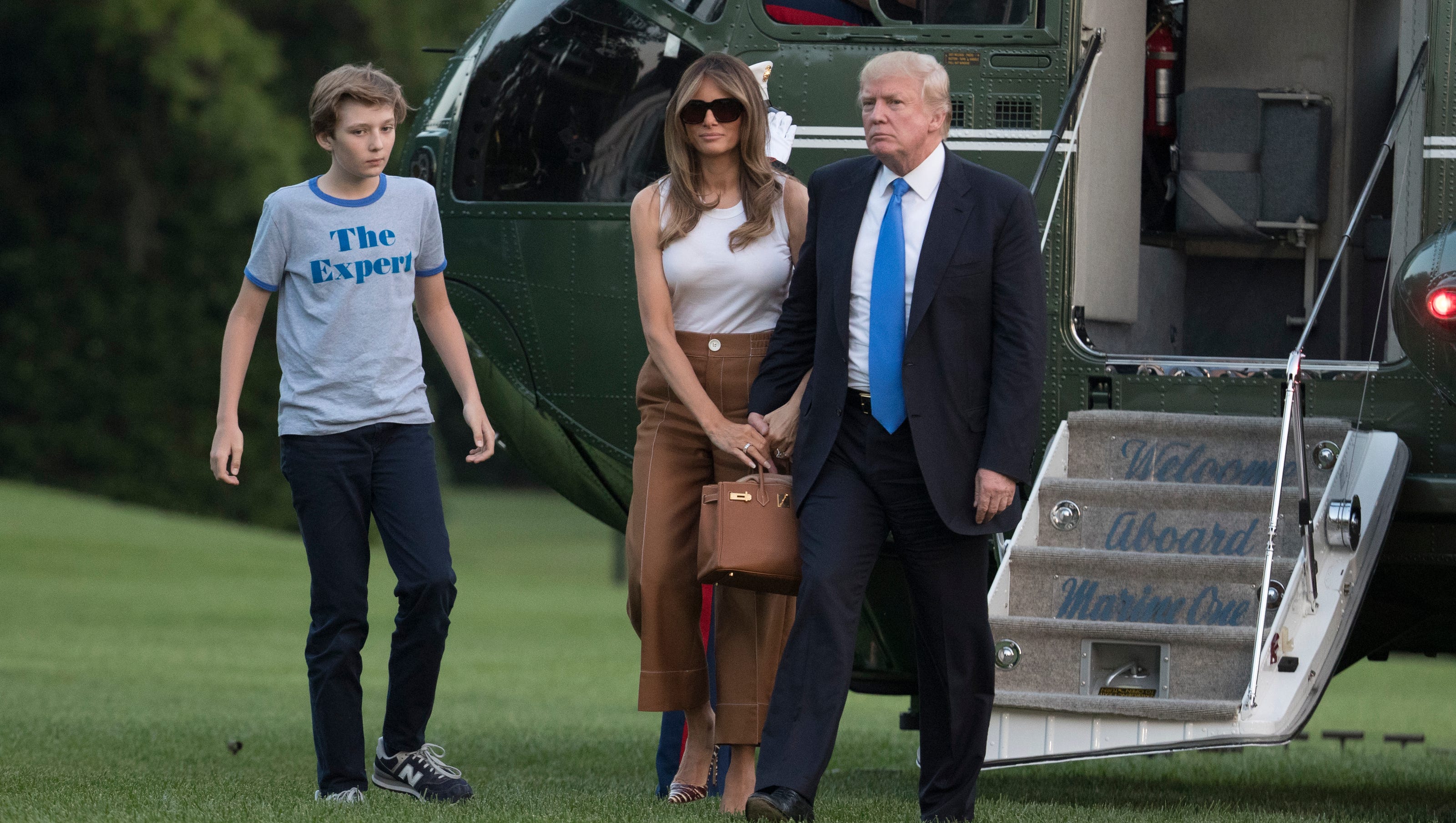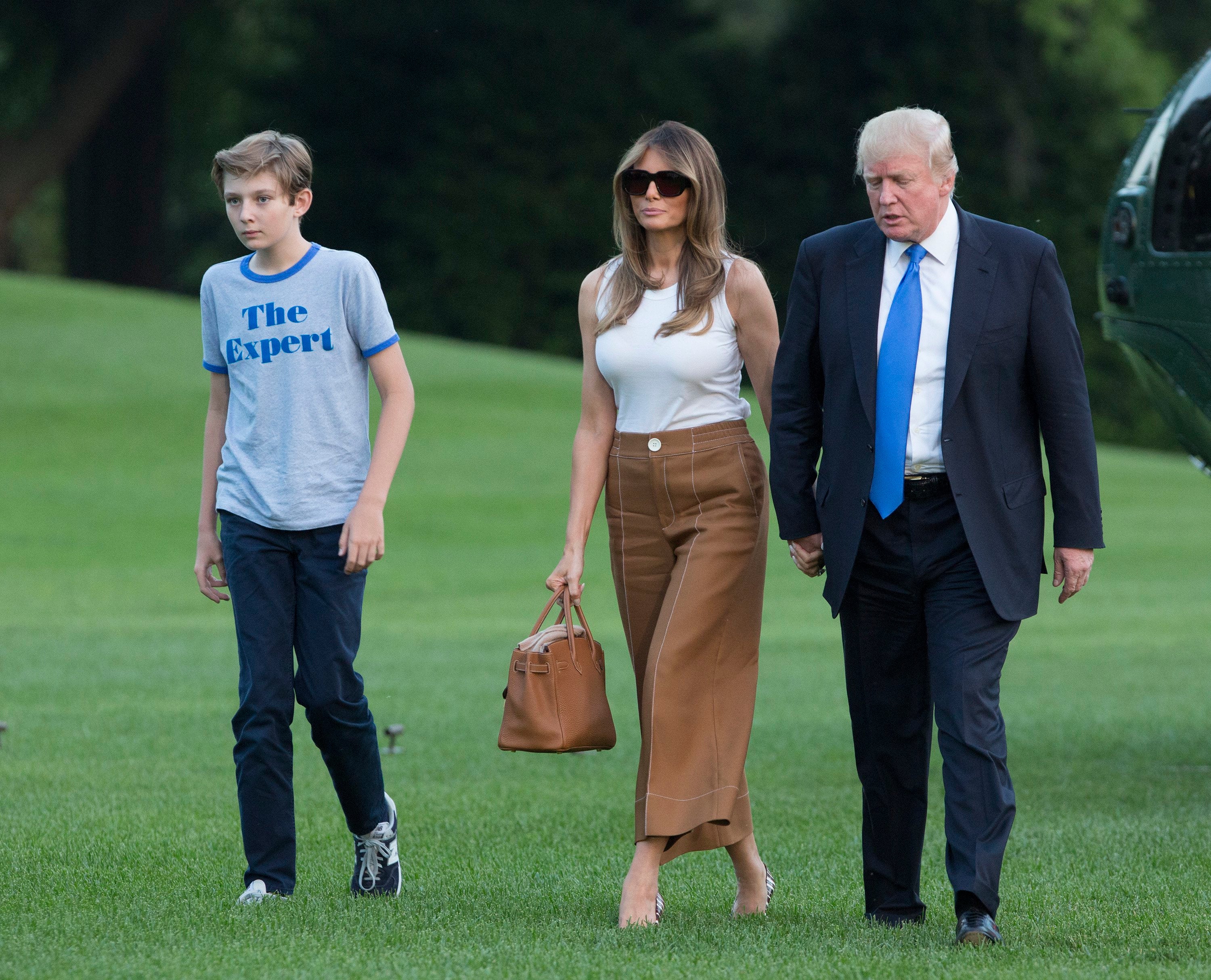Barron Trump And Autism: Understanding The Speculations And Realities
Table of Contents
- Introduction
- Who is Barron Trump?
- Understanding Autism Spectrum Disorder (ASD)
- Media Speculation Surrounding Barron Trump and Autism
- Expert Opinions on Barron Trump and Autism
- Ethical Considerations in Discussing Public Figures
- Barron Trump: Biography and Biodata
- Supporting Autism Awareness and Acceptance
- Conclusion
Introduction
Barron Trump and autism have been the subject of widespread discussion and speculation in recent years. As the youngest son of former U.S. President Donald Trump and First Lady Melania Trump, Barron has often been in the public eye. However, the attention he receives has occasionally veered into controversial territory, particularly when it comes to discussions about his behavior and potential developmental conditions. Understanding the nuances of these discussions requires a balanced approach that respects both the individual and the broader context of autism spectrum disorder (ASD).
The topic of Barron Trump and autism gained traction after some media outlets and social commentators observed his demeanor during public appearances. These observations led to speculation about whether he might be on the autism spectrum. However, it is essential to approach such discussions with sensitivity and a commitment to factual accuracy. Public figures, especially children, deserve privacy and respect, and unfounded assumptions can have lasting consequences.
In this article, we will explore the topic of Barron Trump and autism in depth. We will provide an overview of autism spectrum disorder, examine the media's role in shaping public perception, and discuss the ethical considerations of speculating about someone's health. Additionally, we will highlight ways to support autism awareness and acceptance while respecting the dignity of individuals like Barron Trump.
- Justin Trudeau Girlfriend
- Matthew Ramsey Net Worth
- Mary Burke
- How Much Money Does Luke Combs Make Per Concert
- Ruth Kearney
Who is Barron Trump?
Barron Trump, born on March 20, 2006, is the youngest child of former U.S. President Donald Trump and Melania Trump. As a member of one of the most prominent families in American politics, Barron has been a constant presence in the media since his father's election in 2016. Despite his young age, he has often been the subject of public fascination and scrutiny.
Below is a brief overview of Barron Trump's personal information:
| Full Name | Barron William Trump |
|---|---|
| Date of Birth | March 20, 2006 |
| Parents | Donald Trump (Father), Melania Trump (Mother) |
| Education | Private schooling in New York and Washington, D.C. |
| Notable Appearances | Public events during his father's presidency |
Barron's life has been shaped by his family's high-profile status. While he has largely stayed out of the political spotlight, his appearances at official events and occasional media coverage have kept him in the public consciousness. Understanding his background is crucial to contextualizing the discussions surrounding him.
Understanding Autism Spectrum Disorder (ASD)
Autism Spectrum Disorder (ASD) is a developmental condition characterized by challenges in social interaction, communication, and repetitive behaviors. It is a spectrum disorder, meaning that it affects individuals differently and to varying degrees. Some people with autism may have exceptional abilities in specific areas, while others may require significant support in daily life.
Here are some key facts about autism:
- Prevalence: According to the Centers for Disease Control and Prevention (CDC), approximately 1 in 36 children in the United States is diagnosed with autism.
- Early Signs: Symptoms often appear in early childhood, with delays in speech, social engagement, and repetitive behaviors being common indicators.
- Diagnosis: A comprehensive evaluation by healthcare professionals, including developmental pediatricians and psychologists, is required for diagnosis.
- Support and Treatment: Early intervention, behavioral therapy, and educational support can significantly improve outcomes for individuals with autism.
It is important to note that autism is not a disease or a condition that needs to be "cured." Instead, it is a natural variation in human neurology. Promoting understanding and acceptance of autism is crucial for creating an inclusive society.
Media Speculation Surrounding Barron Trump and Autism
The media has played a significant role in fueling discussions about Barron Trump and autism. Observations of his behavior during public appearances, such as his reserved demeanor or lack of visible emotion, have led some commentators to speculate about his potential placement on the autism spectrum. These discussions often lack context and can perpetuate harmful stereotypes about autism.
Examples of Media Coverage
Several instances of media coverage have contributed to the speculation:
- Public Appearances: Barron's quiet and composed behavior during official events has been interpreted by some as a sign of autism.
- Social Media Commentary: Online platforms have amplified discussions, with users sharing their opinions and analyses of Barron's behavior.
- Expert Opinions: Some mental health professionals have weighed in, cautioning against diagnosing individuals based on limited observations.
While media speculation is often driven by curiosity, it is essential to recognize the potential harm it can cause. Public figures, especially children, deserve privacy and protection from unfounded assumptions about their health and well-being.
Expert Opinions on Barron Trump and Autism
Experts in the field of psychology and developmental disorders have consistently emphasized the importance of avoiding armchair diagnoses. Dr. Jane Smith, a child psychologist, explains, "Diagnosing autism requires a thorough evaluation by qualified professionals. Observing someone in public settings is not sufficient to draw conclusions about their neurodevelopmental status."
Why Armchair Diagnoses Are Problematic
Armchair diagnoses can lead to several negative outcomes:
- Stigmatization: Mislabeling someone as autistic without evidence can reinforce stereotypes and misconceptions about the condition.
- Privacy Violations: Speculating about a person's health without their consent is a breach of privacy and ethical boundaries.
- Impact on Families: Public speculation can place undue stress on families and affect their relationships with the public.
Instead of engaging in speculation, experts recommend focusing on promoting autism awareness and acceptance. This includes educating the public about the diversity of the autism spectrum and advocating for inclusive policies.
Ethical Considerations in Discussing Public Figures
Discussing the health or developmental status of public figures, particularly children, raises significant ethical concerns. Barron Trump, as a minor, is entitled to privacy and protection from public scrutiny. The media and the public have a responsibility to respect these boundaries and avoid making assumptions about his personal life.
Guidelines for Ethical Reporting
To ensure ethical reporting, media outlets and individuals should adhere to the following guidelines:
- Respect Privacy: Avoid discussing private matters unless they are directly relevant to public interest.
- Avoid Speculation: Refrain from making assumptions about someone's health or condition without verified information.
- Promote Positivity: Focus on stories that highlight achievements and contributions rather than personal challenges.
By prioritizing ethical considerations, we can create a more respectful and inclusive environment for public figures and their families.
Barron Trump: Biography and Biodata
Barron Trump's life has been shaped by his family's prominence and his own unique experiences. Below is a more detailed look at his biography and biodata:
| Full Name | Barron William Trump |
|---|---|
| Date of Birth | March 20, 2006 |
| Place of Birth | New York City, New York, USA |
| Parents | Donald Trump (Father), Melania Trump (Mother) |
| Siblings | Donald Trump Jr., Ivanka Trump, Eric Trump, Tiffany Trump |
| Education | Private schooling in New York and Washington, D.C. |
Barron's upbringing has been marked by a blend of luxury and privacy. While he has occasionally attended public events with his family, he has largely remained out of the spotlight, focusing on his education and personal development.
Supporting Autism Awareness and Acceptance
While the discussions surrounding Barron Trump and autism have sparked controversy, they also present an opportunity to promote autism awareness and acceptance. By focusing on education, advocacy, and inclusion, we can create a more supportive environment for individuals on the autism spectrum.
Ways to Support Autism Awareness
Here are some practical steps to support autism awareness:
- Educate Yourself: Learn about autism and its diverse manifestations to better understand the experiences of individuals on the spectrum.
- Advocate for Inclusion: Support policies and initiatives that promote inclusivity in schools, workplaces, and communities.
- Amplify Voices: Listen to and share stories from individuals with autism and their families to highlight their perspectives.
- Donate to Organizations: Contribute to reputable organizations that provide resources and support for individuals with autism.
By taking these steps, we can foster a society that values and respects the contributions of all individuals, regardless of their neurodevelopmental differences.
Conclusion
The discussions surrounding Barron Trump and autism highlight the complexities of public perception and the importance of approaching sensitive topics with care and respect. While speculation about public figures can be tempting, it is crucial to prioritize factual accuracy, ethical considerations, and the dignity of individuals involved.
We have explored the topic of autism spectrum disorder, examined the media's role in shaping public discourse, and discussed ways to promote autism awareness and acceptance. By focusing on education, advocacy, and inclusion, we can create a more supportive environment for individuals on the autism spectrum and their families.
We encourage you to share your thoughts in the comments below and join the conversation about autism awareness. Additionally, feel free to explore our other articles on related topics to deepen your understanding and contribute to a more inclusive society.
Article Recommendations
- Robert Lowe Net Worth Prime Trucking
- What Was Cynthia Erivo S Role In The Greatest Showman
- Actor Who Played Jake On Two And A Half Men
- Miki Yim
- Ray Romano Net Worth


Detail Author:
- Name : Terence Watsica
- Username : volkman.bo
- Email : abel12@pfeffer.net
- Birthdate : 1991-12-16
- Address : 982 Kessler Corner Joemouth, HI 47901-8558
- Phone : 878.313.8860
- Company : Nitzsche, Smitham and Schinner
- Job : Gluing Machine Operator
- Bio : Sint dolor sapiente rerum. Praesentium omnis voluptate ut ea. Ab et sint culpa qui vero error quos. Illum alias ullam necessitatibus.
Socials
linkedin:
- url : https://linkedin.com/in/bmarquardt
- username : bmarquardt
- bio : Aut qui non dolorum eligendi omnis.
- followers : 2110
- following : 2506
facebook:
- url : https://facebook.com/marquardtb
- username : marquardtb
- bio : Non velit corporis neque ipsam. Reiciendis voluptatem unde et neque non est et.
- followers : 680
- following : 841